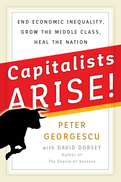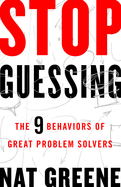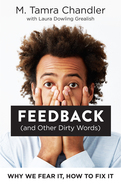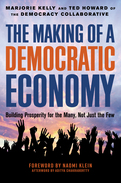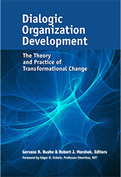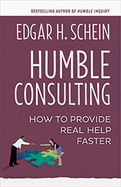Search Results: "Seeing Red Cars"
Results 229-234 of 246
Capitalists Arise!
2017
Peter Georgescu arrived in this country as a penniless Romanian refugee and rose to become the CEO of Young & Rubicam. This is why he's so heartsick that with flat wages, disappearing jobs, and a shrinking middle class, his kind of rags-to-riches story doesn't seem possible now. But he has a message for his fellow CEOs: we're the ones who must take the lead in fixing the economy.
Marshaling deeply sobering statistics, Georgescu depicts the stark reality of America today: a nation with greater wealth inequality and lower social mobility than just about any other country in the developed world. But the problem isn't that free-market capitalism no longer works—it's that it's been hijacked by shareholder primacy. Where once our business leaders looked to the needs and interests of a variety of stakeholders—employees, community members, the business itself—now they're myopically focused on maximizing their shareholders' quarterly returns.
Capitalists, Arise! shows how the short-term thinking spawned by shareholder primacy lies at the root of our current economic malaise and social breakdown. But Georgescu offers concrete actions that capitalists themselves can take to create a better future. The irony is that if businesses do this, shareholders will do even better. In the long run, businesses can thrive only when society is healthy and strong. This book is a manifesto calling on capitalists to heal the nation that has given them so much.
Marshaling deeply sobering statistics, Georgescu depicts the stark reality of America today: a nation with greater wealth inequality and lower social mobility than just about any other country in the developed world. But the problem isn't that free-market capitalism no longer works—it's that it's been hijacked by shareholder primacy. Where once our business leaders looked to the needs and interests of a variety of stakeholders—employees, community members, the business itself—now they're myopically focused on maximizing their shareholders' quarterly returns.
Capitalists, Arise! shows how the short-term thinking spawned by shareholder primacy lies at the root of our current economic malaise and social breakdown. But Georgescu offers concrete actions that capitalists themselves can take to create a better future. The irony is that if businesses do this, shareholders will do even better. In the long run, businesses can thrive only when society is healthy and strong. This book is a manifesto calling on capitalists to heal the nation that has given them so much.
Stop Guessing
2017
Become the greatest problem solver you can be!
Bad problem solving costs individuals and society incalculable amounts of time, money, and sanity. In this book Nat Greene—who's been solving hard problems professionally for over twenty years—shares nine behaviors anyone can adopt to find solutions to even the most seemingly intractable problems.
The problem with most problem solving, Greene says, is that it's not problem solving at all: it's guessing. We have an idea of what might work and we try it out. If that doesn't work, we try something else. And so on. It's inefficient at best, and with really hard problems there are simply too many variables for guessing to work. Greene shows you how to adopt the behaviors great problem solvers use to arrive at solutions efficiently—without guessing. He illustrates them with examples ranging from everyday issues like fixing a malfunctioning garage door to stopping frequent breakdowns at a chemical plant (saving millions of dollars) to addressing the scourge of poverty in sub-Saharan Africa. So stop guessing and start solving today!
Bad problem solving costs individuals and society incalculable amounts of time, money, and sanity. In this book Nat Greene—who's been solving hard problems professionally for over twenty years—shares nine behaviors anyone can adopt to find solutions to even the most seemingly intractable problems.
The problem with most problem solving, Greene says, is that it's not problem solving at all: it's guessing. We have an idea of what might work and we try it out. If that doesn't work, we try something else. And so on. It's inefficient at best, and with really hard problems there are simply too many variables for guessing to work. Greene shows you how to adopt the behaviors great problem solvers use to arrive at solutions efficiently—without guessing. He illustrates them with examples ranging from everyday issues like fixing a malfunctioning garage door to stopping frequent breakdowns at a chemical plant (saving millions of dollars) to addressing the scourge of poverty in sub-Saharan Africa. So stop guessing and start solving today!
A practical and irreverent guide to taking the sting out of feedback and reclaiming it as a motivating, empowering experience for everyone involved.
Feedback: the mere mention of the word can make our blood pressure rise and our defenses go up. For many of us, it's a dirty word that we associate with bias, politics, resentment, and self-doubt. However, if we take a step back and think about its true intent, we realize that feedback needn't be a bad thing. After all, understanding how others experience us provides valuable opportunities to learn and grow.
Authors M. Tamra Chandler and Laura Grealish explain how feedback got such a bad rap and how to recognize and minimize the negative physical and emotional responses that can erode trust and shut down communication. They offer a new and more ambitious definition of feedback, explore the roles we each play as Seeker, Extender, and Receiver, and introduce the three Fs of making feedback focused, fair, and frequent. You'll also find valuable exercises and strategies, along with real-world examples that illustrate how you can put these ideas into action and join in the movement to fix feedback, once and for all.
When it's done right, feedback has been proven to be the most effective means of improving communication and performance for you and your organization. It's too important to give up, and with Chandler and Grealish's help, you'll be able to use it deftly, equitably, and effectively.
Feedback: the mere mention of the word can make our blood pressure rise and our defenses go up. For many of us, it's a dirty word that we associate with bias, politics, resentment, and self-doubt. However, if we take a step back and think about its true intent, we realize that feedback needn't be a bad thing. After all, understanding how others experience us provides valuable opportunities to learn and grow.
Authors M. Tamra Chandler and Laura Grealish explain how feedback got such a bad rap and how to recognize and minimize the negative physical and emotional responses that can erode trust and shut down communication. They offer a new and more ambitious definition of feedback, explore the roles we each play as Seeker, Extender, and Receiver, and introduce the three Fs of making feedback focused, fair, and frequent. You'll also find valuable exercises and strategies, along with real-world examples that illustrate how you can put these ideas into action and join in the movement to fix feedback, once and for all.
When it's done right, feedback has been proven to be the most effective means of improving communication and performance for you and your organization. It's too important to give up, and with Chandler and Grealish's help, you'll be able to use it deftly, equitably, and effectively.
Our economy is designed by the 1 percent, for the 1 percent. This book offers a compelling vision of an equitable, ecologically sustainable alternative that meets the essential needs of all people.
We live in a world where twenty-six billionaires own as much wealth as half the planet's population. The extractive economy we live with now enables the financial elite to squeeze out maximum gain for themselves, heedless of damage to people or planet. But Marjorie Kelly and Ted Howard show that there is a new economy emerging focused on helping everyone thrive while respecting planetary boundaries.
At a time when competing political visions are at stake the world over, this book urges a move beyond tinkering at the margins to address the systemic crisis of our economy. Kelly and Howard outline seven principles of what they call a Democratic Economy: community, inclusion, place (keeping wealth local), good work (putting labor before capital), democratized ownership, ethical finance, and sustainability. Each principle is paired with a place putting it into practice: Pine Ridge, Preston, Portland, Cleveland, and more.
This book tells stories not just of activists and grassroots leaders but of the unexpected accomplices of the Democratic Economy. Seeds of a future beyond corporate capitalism and state socialism are being planted in hospital procurement departments, pension fund offices, and even company boardrooms.
The road to a system grounded in community, democracy, and justice remains uncertain. Kelly and Howard help us understand we make this road as we walk it by taking a first step together beyond isolation and despair.
We live in a world where twenty-six billionaires own as much wealth as half the planet's population. The extractive economy we live with now enables the financial elite to squeeze out maximum gain for themselves, heedless of damage to people or planet. But Marjorie Kelly and Ted Howard show that there is a new economy emerging focused on helping everyone thrive while respecting planetary boundaries.
At a time when competing political visions are at stake the world over, this book urges a move beyond tinkering at the margins to address the systemic crisis of our economy. Kelly and Howard outline seven principles of what they call a Democratic Economy: community, inclusion, place (keeping wealth local), good work (putting labor before capital), democratized ownership, ethical finance, and sustainability. Each principle is paired with a place putting it into practice: Pine Ridge, Preston, Portland, Cleveland, and more.
This book tells stories not just of activists and grassroots leaders but of the unexpected accomplices of the Democratic Economy. Seeds of a future beyond corporate capitalism and state socialism are being planted in hospital procurement departments, pension fund offices, and even company boardrooms.
The road to a system grounded in community, democracy, and justice remains uncertain. Kelly and Howard help us understand we make this road as we walk it by taking a first step together beyond isolation and despair.
A Dynamic New Approach to Organizational Change
Dialogic Organization Development is a compelling alternative to the classical action research approach to planned change. Organizations are seen as fluid, socially constructed realities that are continuously created through conversations and images. Leaders and consultants can help foster change by encouraging disruptions to taken-for-granted ways of thinking and acting and the use of generative images to stimulate new organizational conversations and narratives. This book offers the first comprehensive introduction to Dialogic Organization Development with chapters by a global team of leading scholar-practitioners addressing both theoretical foundations and specific practices.
Dialogic Organization Development is a compelling alternative to the classical action research approach to planned change. Organizations are seen as fluid, socially constructed realities that are continuously created through conversations and images. Leaders and consultants can help foster change by encouraging disruptions to taken-for-granted ways of thinking and acting and the use of generative images to stimulate new organizational conversations and narratives. This book offers the first comprehensive introduction to Dialogic Organization Development with chapters by a global team of leading scholar-practitioners addressing both theoretical foundations and specific practices.
Humble Consulting
2016
Consulting in Complex and Changing Times
Organizations face challenges today that are too messy and complicated for consultants to simply play doctor: run a few tests, offer a neat diagnosis of the “problem,” and recommend a solution. Edgar Schein argues that consultants have to jettison the old idea of professional distance and work with their clients in a more personal way, emphasizing authentic openness, curiosity, and humility. Schein draws deeply on his own decades of experience, offering over two dozen case studies that illuminate each stage of this humble consulting process. Just as he did with Process Consultation nearly fifty years ago, Schein has once again revolutionized the field, enabling consultants to be more genuinely helpful and vastly more effective.
Organizations face challenges today that are too messy and complicated for consultants to simply play doctor: run a few tests, offer a neat diagnosis of the “problem,” and recommend a solution. Edgar Schein argues that consultants have to jettison the old idea of professional distance and work with their clients in a more personal way, emphasizing authentic openness, curiosity, and humility. Schein draws deeply on his own decades of experience, offering over two dozen case studies that illuminate each stage of this humble consulting process. Just as he did with Process Consultation nearly fifty years ago, Schein has once again revolutionized the field, enabling consultants to be more genuinely helpful and vastly more effective.


